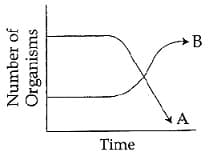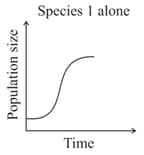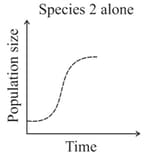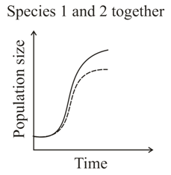EASY
Earn 100
Competitive exclusion principle was put forward by G. F. Gause, on which of the basis of following experiments?
(a)Chlorella
(b)Paramecium
(c)Microcystis
(d)Cuckoo birds
50% studentsanswered this correctly
Important Questions on Organisms and Populations
EASY
EASY
MEDIUM
Assertion (A): The Monarch butterfly feeds on poisonous weeds during its caterpillar stage.
Reason (R): It helps butterfly to become distasteful to the predator.
EASY
EASY
EASY
EASY
EASY
HARD
1) The human liver fluke, a nematode parasite, depends on two intermediate hosts (a snail and a fish) to complete its life cycle.
2) The malarial parasite needs a vector (mosquito) to spread to other host organisms.
3) In case of brood parasitism, the eggs of parasitic birds (e.g., cuckoo) are not detected and removed from the nest because the parasite's eggs resemble the host's eggs in morphology and colour.
4) A population of frogs protected from all predators would decrease indefinitely.
MEDIUM
If resources are limited
If two species occupy different niches
If resource partitioning takes place between two species
If two species occupy identical niche
MEDIUM
Match column-I with column-II and select the correct option.
| Column-I | Column-II | ||
| a) | Commensalism | i) | Lichen |
| b) | Mutualism | ii) | Plasmodium |
| c) | Parasitism | iii) | Hawk |
| d) | Predation | iv) | Orchid |
HARD
| Column-I | Column-II | ||
|---|---|---|---|
| Saprophyte | Symbiotic association of fungi with plant roots | ||
| Parasite | Decomposition of dead organic materials | ||
| Lichens | Living on living plants | ||
| Mycorrhiza | Symbiotic association of algae and fungi |
Choose the correct answer from the options given below:
EASY
Relate Column I with Column II with regard to predatory behaviour
| Column-I | Column-I | ||
| Calotropis | p. | Invertebrates | |
| Pisaster | q. | Distasteful | |
| Monarch butterfly | r. | Cryptically coloured | |
| Frogs | s. | Cardioglycoside |
MEDIUM

EASY
MEDIUM
Match the items in Column with those in Column:
| Column | Column | ||
| (a) | Herbivores-Plants | (i) | Commensalism |
| (b) | Mycorrhiza-Plants | (ii) | Mutualism |
| (c) | Sheep-Cattle | (iii) | Predation |
| (d) | Orchid-Tree | (iv) | Competition |
Select the correct option from following:
MEDIUM
Study the following table and pick up the correct combinations.
| S.No. | Interaction | Species A | Species B |
| I) | Mutualism | ||
| II) | Competition | ||
| III) | Predation | ||
| IV) | Parasitism | ||
| V) | Commensalism | ||
| VI) | Amensalism |
HARD
Given the graphs below, the interaction between species and can be classified as



EASY
EASY

